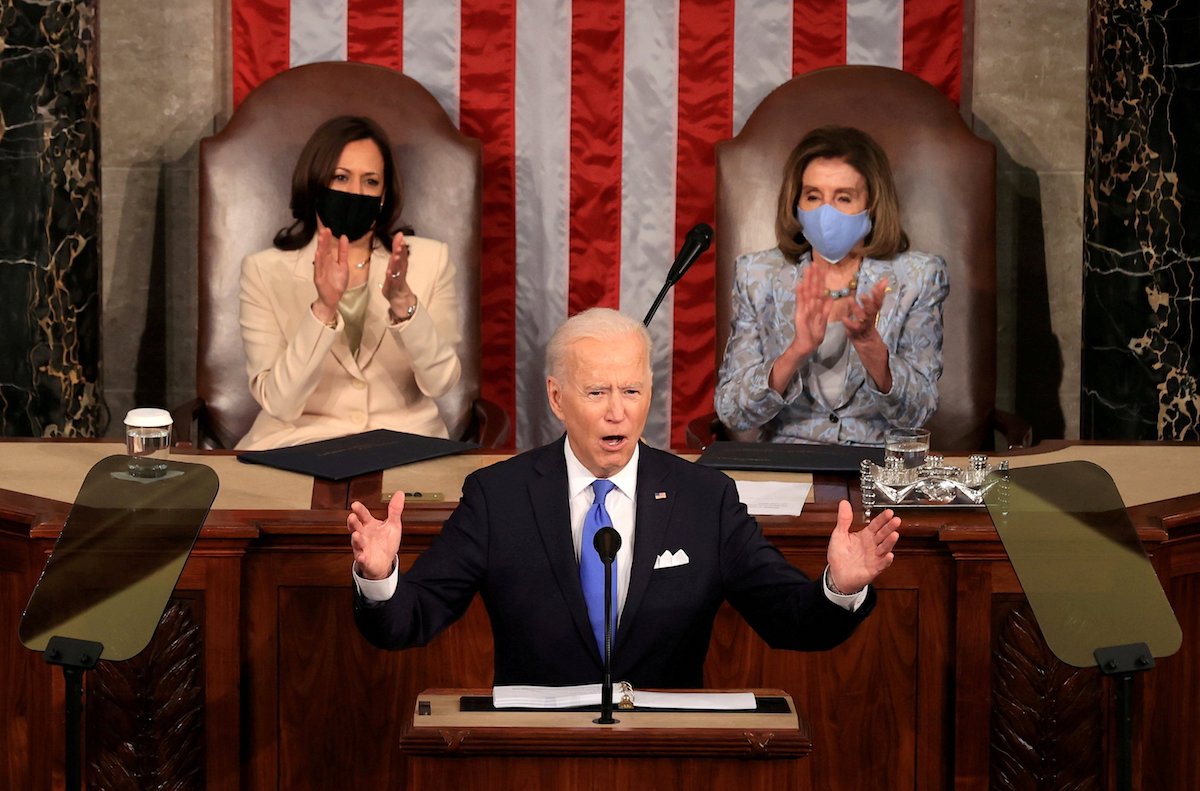CLEVELAND (CNS) — The multitrillion dollar spending bill being considered in Congress has gained support from key Catholic advocates in large part because of measures that would help reduce poverty.
The $3.5 trillion spending package being pushed by President Joe Biden under his “Build Back Better” agenda includes provisions to expand Medicaid and Medicare coverage, support housing vouchers, boost child nutrition programs and expand tax credits for low-income families among other provisions.
Such measures, the advocates told Catholic News Service, are vital to protect human dignity and serve the common good.
“They’re all so crucial because this is a once-in-a-generation opportunity to invest in low-income individuals and families,” said Presentation Sister Richelle Friedman, director of public policy at the Coalition on Human Needs.
Anthony Granado, vice president of government relations at Catholic Charities USA, described the bill as the “largest investment in the social safety net since the New Deal” adopted in the midst of the Great Depression in the 1930s.
The bill’s final language continued to be written ahead of congressional Democrats’ self-imposed deadline of a vote the week of Sept. 27.
Party leaders are attempting to walk a tightrope between the progressive wing of the party and more moderate members. Democrats have a thin majority in the House and hold 50 seats in the Senate and cannot afford to lose any votes on a bill that they have said is essential to reaching their goals of reducing income inequality and supporting working-class families.
In the Senate, a 50-50 split on the measure would find Vice President Kamala Harris casting the deciding vote.
While the final spending total may be reduced during negotiations, several provisions of the bill that address the needs of low- and moderate-income families are supported by the U.S. Conference of Catholic Bishops, Catholic Charities USA, the Catholic Health Association of the United States as well as advocacy groups such as Network, the Catholic social justice lobbying organization.
“From the start, it is growing the economy from the bottom up, which is not only good economic policy, but it’s also the embodiment of the Catholic social justice tradition,” Mary Novak, Network’s executive director, said.
Despite supporting many of the bill’s measures, the chairmen of two bishops’ committees said they would not back the legislation if it includes language to fund abortion.
Archbishop Joseph F. Naumann of Kansas City, Kansas, chairman of the Committee on Pro-Life Activities, and Archbishop Paul S. Coakley of Oklahoma City, chairman of the Committee on Domestic Justice and Human Development, have objected to abortion funding language that was added by two House committees to wording to provisions that would to improve access to affordable health care for all.
The funding of abortion, “the deliberate destruction of our most vulnerable brothers and sisters — those in the womb — cannot be included,” the bishops said Sept. 17.
“Congress can, and must, turn back from including taxpayer funding of abortion, in the Build Back Better Act,” they said. “We urge all members of Congress and the administration to work in good faith to advance important and life-saving health care provisions without forcing Americans to pay for the deliberate destruction of unborn human life.”
Granado said the agency has asked Congress “to proceed in a manner that does protect human life and dignity in a consistent way from conception to natural death.”
CCUSA, he said, also has urged congressional leaders to maintain funding as originally proposed for initiatives that are vital to support human dignity, particularly grants for child care facilities and to supplement the wages of qualified child care providers, workforce development and training programs, child nutrition and housing measures designed to prevent homelessness.
“This would have significant impact if passed, particularly for vulnerable people,” Granado told CNS.
As negotiations among Democrats continue, Catholic advocates expect that two key tax credits that have proven successful in reducing poverty would remain in the bill.
One provision would extend through 2025 an expanded version of the Child Tax Credit adopted earlier this year under the American Rescue Plan. Sister Friedman said an analysis by the Columbia University Center on Poverty and Social Policy found that child poverty would be reduced by 40% with the credit’s extension.
Federal data has shown that after one monthly allotment of $250 to $300 per child, the number of adults living with children reporting that they did not have enough to eat in a week dropped by 3.3 million, or nearly one-third, the Coalition on Human Needs reported.
The bill also calls for a permanent increase in benefits in the Earned Income Tax Credit for workers without dependent children and would extend benefits to those 19 and older with no upper age limit. Improvement in the Child and Dependent Care Credit would become permanent and be made available to families with incomes too low to pay federal income taxes, Sister Friedman said.
The Catholic Health Association also has offered its support for many provisions, especially those affecting health care access.
In a Sept. 7 letter to congressional leaders, Mercy Sister Mary Haddad, CHA’s president and CEO, called on legislators to include provisions in the bill to expand access to affordable health care, address health equity, shore up the health care workforce and enhance the social safety net.
“Congress has a historic opportunity now to enact policies critical to rebuilding communities still struggling with the effects of the pandemic and supporting those most affected including the elderly, families and children and low-income, minority and rural populations,” Sister Haddad wrote.
The bill would offset the spending proposals by raising taxes on the highest-earning Americans and corporations. The House Ways and Means Committee, charged with writing tax policy, has drafted tax measures that would raise about $2.3 trillion.
The main avenues in the bill call for raising corporate tax rates from 21% to 26.5% for businesses earning more than $5 million a year and increasing the top individual tax from 37% to 39.6% for individuals earning more than $400,000 or $450,000 for a married couple.
Wealthy people making more than $5 million a year would see a 3% surcharge on adjusted incomes.
Another provision includes additional funding for the Internal Revenue Service to increase enforcement of collecting tax revenues.
Advocates largely support such measures.
“All have a duty to support the common good, particularly people of means and corporations. It is just for them to be taxed and to support the common good of society,” CCUSA’s Granado said.
Network’s Novak agreed, telling CNS that the measures in large part reverse the tax rate reductions including in the Tax Cuts and Jobs Act of 2017.
She pointed to data collected by three organizations that showed the need to raise taxes on the nation’s wealthiest citizens is necessary.
The Institute for Policy Research and Americans for Tax Fairness released a study Aug. 24 showing that U.S. billionaires saw their wealth increase by $1.8 trillion in the 17 months since the pandemic began sweeping the country in March 2020.
An earlier analysis by the Institute on Taxation and Public Policy found that 55 of the country’s largest corporations paid no federal income taxes on revenues of nearly $40.5 billion in 2020.
“We have an opportunity to transform our economy with this legislation,” Novak said. “To pay for these investments in our people is politics for the common good.”







